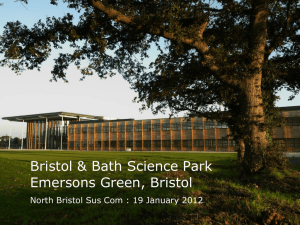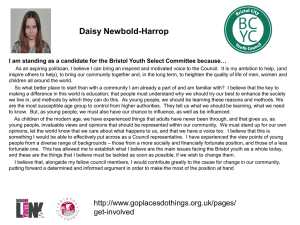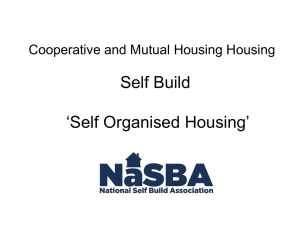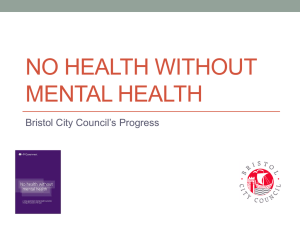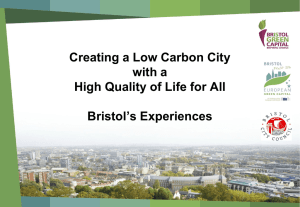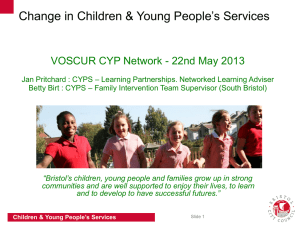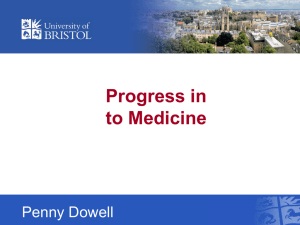Smart Cities Bristol briefing note
advertisement
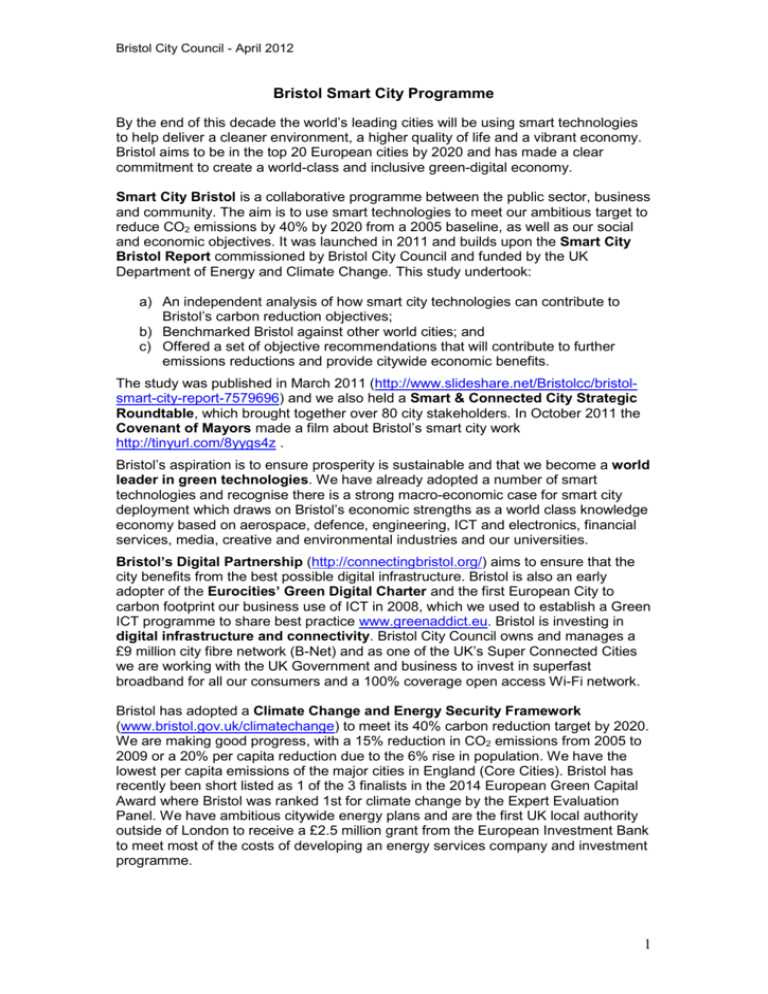
Bristol City Council - April 2012 Bristol Smart City Programme By the end of this decade the world’s leading cities will be using smart technologies to help deliver a cleaner environment, a higher quality of life and a vibrant economy. Bristol aims to be in the top 20 European cities by 2020 and has made a clear commitment to create a world-class and inclusive green-digital economy. Smart City Bristol is a collaborative programme between the public sector, business and community. The aim is to use smart technologies to meet our ambitious target to reduce CO2 emissions by 40% by 2020 from a 2005 baseline, as well as our social and economic objectives. It was launched in 2011 and builds upon the Smart City Bristol Report commissioned by Bristol City Council and funded by the UK Department of Energy and Climate Change. This study undertook: a) An independent analysis of how smart city technologies can contribute to Bristol’s carbon reduction objectives; b) Benchmarked Bristol against other world cities; and c) Offered a set of objective recommendations that will contribute to further emissions reductions and provide citywide economic benefits. The study was published in March 2011 (http://www.slideshare.net/Bristolcc/bristolsmart-city-report-7579696) and we also held a Smart & Connected City Strategic Roundtable, which brought together over 80 city stakeholders. In October 2011 the Covenant of Mayors made a film about Bristol’s smart city work http://tinyurl.com/8yygs4z . Bristol’s aspiration is to ensure prosperity is sustainable and that we become a world leader in green technologies. We have already adopted a number of smart technologies and recognise there is a strong macro-economic case for smart city deployment which draws on Bristol’s economic strengths as a world class knowledge economy based on aerospace, defence, engineering, ICT and electronics, financial services, media, creative and environmental industries and our universities. Bristol’s Digital Partnership (http://connectingbristol.org/) aims to ensure that the city benefits from the best possible digital infrastructure. Bristol is also an early adopter of the Eurocities’ Green Digital Charter and the first European City to carbon footprint our business use of ICT in 2008, which we used to establish a Green ICT programme to share best practice www.greenaddict.eu. Bristol is investing in digital infrastructure and connectivity. Bristol City Council owns and manages a £9 million city fibre network (B-Net) and as one of the UK’s Super Connected Cities we are working with the UK Government and business to invest in superfast broadband for all our consumers and a 100% coverage open access Wi-Fi network. Bristol has adopted a Climate Change and Energy Security Framework (www.bristol.gov.uk/climatechange) to meet its 40% carbon reduction target by 2020. We are making good progress, with a 15% reduction in CO2 emissions from 2005 to 2009 or a 20% per capita reduction due to the 6% rise in population. We have the lowest per capita emissions of the major cities in England (Core Cities). Bristol has recently been short listed as 1 of the 3 finalists in the 2014 European Green Capital Award where Bristol was ranked 1st for climate change by the Expert Evaluation Panel. We have ambitious citywide energy plans and are the first UK local authority outside of London to receive a £2.5 million grant from the European Investment Bank to meet most of the costs of developing an energy services company and investment programme. 1 Bristol City Council - April 2012 In Bristol we recognise that it is the innovative integration of different technologies that make cities and communities ‘smart’ and that this requires the commitment and close collaboration of city stakeholders. The involvement of people and communities is even more important; it’s about how people work with the technology and it’s important to involve them in the development of experiences, products and services that help the City to achieve its aims. We believe having a distinctive strength is what makes a Smart City and in Bristol our strength is the collaboration of our micro-electronic and environmental technology sectors with our creative/digital companies who are working with communities to make them smart, for example through Bristol’s Living Lab in Knowle West. The Bristol Smart City Programme currently focuses on 3 key areas: Smart Energy Smart Transport Smart Data However further strands are in development recognising the need to address wider social and economic city challenges for example tele-health. We are currently implementing a wide range of initiatives, as well as developing future projects and funding bids. An overview of existing projects within the programme is given below but further details are available on the projects we are developing from: Lorraine Hudson (Bristol Futures Group) Email: Lorraine.Hudson@bristol.gov.uk Tel: 0117 922 4470 2 Bristol City Council - April 2012 Smart Energy DEHEMS The Digital Environment Home Energy Management System (DEHEMS) project looked at how technology can improve domestic energy efficiency. The project partnership included a mix of European local authorities, private business and universities. The intention was to develop and test a home energy management system with the aim of improving the current monitoring approach to levels of energy being used by households in order to reduce CO2 emissions. In Bristol the smart metering technology was deployed in 50 social houses in Knowle West. The key learning was it is critical to engage citizens and work with them in a collaborative approach. From the start of the project, all the DEHEMS users were organised in “Living Labs” which are groups of people who are actively involved in the creation and evaluation of technologies which they will ultimately use. The project found that behaviour change is often best carried out in a group or community context, the presence of other people with the same interest and motivation helps to reinforce the change in behaviour and eventually turn it into a habit. When people are given access to information about their energy usage in a way which makes sense to them, they will often change their consumption patterns very dramatically. Many users who liked the DEHEMS dashboard used it as a game for investigating their real time energy usage by switching on and off various appliances and viewing the impact. In ICT projects like DEHEMS priority must be given to enhancing the user experience and the golden rule is to keep things simple. UK partners: Bristol City Council, Knowle West Media Centre, Hildebrand Technology Ltd, University of Salford, Coventry University, Manchester City Council, Birmingham City Council and Clicks and Links Ltd. Duration: 2008-11 Funding: European Commission FP7 Website: http://www.dehems.eu/about BCC contact: kevin.omalley@bristol.gov.uk 3e-Houses The 3e-Houses project consists of integrating the most common ICTs into social housing in order to allow homes to save energy, shift their consumption from peak to off-peak hours and reduce CO2 emissions. The project intends to promote energy saving by helping users to find out how and how much they consume by using the most common ICTs applied to energy consumption. It offers: Real time monitoring and management of the energy consumption Integration of renewable energies Development of tools for designing and evaluating energy saving plans Thus an interaction is created between the intelligent devices and the users, allowing the users to increase their knowledge of their energy consumption and therefore change their patterns of energy use. 3e-Houses was deployed in social housing in Germany and Spain in 2010 and is being replicated in Bulgaria and Bristol in 2012. In Bristol 100 social houses are participating in the project and partners are working with them in a collaborative approach building on the finding from DEHEMS. UK partners: Bristol City Council, Knowle West Media Centre, Toshiba Research Europe Ltd and IP-Performance Ltd. Duration: 2010-13 Funding: European Commission ICT-PSP Website: http://www.3ehouses.eu/ BCC contact: kevin.omalley@bristol.gov.uk 3 Bristol City Council - April 2012 Low Carbon Network Fund - B.R.I.S.T.O.L. Buildings, Renewables, Integrated Storage with Tariffs to Overcome network Limitations (B.R.I.S.T.O.L.) was funded through Ofgem’s Low Carbon Networks Fund in November 2011. Western Power Distribution are the consortium lead and Bristol City Council will deploy the technology at their sites, with Knowle West Media Centre co-ordinating the outreach work, Siemens providing the technology and the University of Bath (working with RWE npower) as the academic partner. This innovative project will integrate Battery Storage with Demand Response, Direct Current Networks to connect PV panels and DC appliances together and Smart Tariffs. The technology will be implemented in 10 schools, 1 office and 30 homes (all owned by the Council) and will address issues associated with the large-scale deployment of photovoltaic (PV) generation. The £2.8m project will run for 3 years and fund measures to enable the local electricity network to become smarter and more efficient, reducing CO 2 emissions and energy bills, and seeking solutions to overcome issues associated with integrating low carbon technologies into the low voltage distribution network. UK partners: Western Power Distribution, Bristol City Council, Knowle West Media Centre, Siemens and the University of Bath. Duration: 2012-15 Funding: Ofgem LCNF Website: coming soon BCC contact: lorraine.hudson@bristol.gov.uk Smart Spaces The aim of the Smart Spaces project is to substantially reduce peak and overall demand for energy and water across EU public buildings. The project will develop a service comprising innovative ICT-based energy decision support, awareness and management service components. Decision support is provided directly to city energy managers and other professionals responsible for building performance, and to building users, both staff and visitors to the building, including school pupils and university students and the general public, enabling all to optimise their energy-related behaviour based on up-todate meter feedback on energy consumption. There will be 11 pilots in 8 countries with almost 20,000 professionals and staff users and it is estimated to reach more than 6,000,000 visitors annually. The partnership is being led by Empirica, a German consultancy firm based in Bonn that specialises in the application and development of new ICT and the information society. Bristol City Council’s Energy Management Unit will be working in partnership with SystemsLink, a leading producer of energy management software for local authorities, to develop a smart system that will utilise the daily electricity and gas meter readings to identify where waste is occurring. This information can be utilised to deliver significant energy savings and make accurate recordings of the Council’s energy usage and it will be deployed at over 500 buildings in Bristol. UK partners: Bristol City Council and SystemsLink Duration: 2012-14 Funding: European Commission ICT-PSP Website: coming soon BCC contact: roddy.black@bristol.gov.uk 4 Bristol City Council - April 2012 STEEP Systems Thinking for comprehensive city Efficient Energy Planning (STEEP) is a project under the FP7 Energy - Smart Cities 2012 call involving San Sebastian (Spain), Bristol (UK) and Florence (Italy). The objective is to contribute to the European aim of making the production and use of energy in cities more sustainable and efficient by the development of smart city plans which address the efficiency of energy flows across all the key sectors in the energy value chain in an integrated manner. It will use a systems thinking approach to create a District Energy Master Plan Process Model. This will be applied in 3 city districts to better understand the systems impacting upon energy use (including energy supply/ distribution, buildings, transport, street lighting, digital infrastructure and waste) and the interventions that can be taken to meet ambitious energy and carbon targets. The process model will be enriched and validated through open innovation methodologies applied with the stakeholders. Bristol will lead Work Package 2 developing the Process Model using Temple Quarter Enterprise Zone as our pilot district. The learning obtained will then be applied at the city level and will be the basis for the development of comprehensive Smart City Plans. With the knowledge gathered in this process, an open-source methodology for developing integrated Smart City Plans will be created along with Key Performance Indicators for monitoring their effectiveness. UK partners: Bristol City Council, Arup, University of Bristol Duration: 2013-14 Funding: European Commission FP7 – currently in negotiation phase Website: coming soon BCC contact: lorraine.hudson@bristol.gov.uk Smart Transport ICT 4 EVEU The ICT services for Electric Vehicle Enhancing the User experience (ICT 4 EVEU) project aims to deploy an innovative set of ICT services for electric vehicles in pilots across Europe. The scope of the ICT services is the integration of different Management Systems operating on the existing EV infrastructures in the cities where the pilots will be run, so that related services can be deployed and make use of these interconnected infrastructures (charging points, control centres and vehicles). The pilots will be based in a growing, geographically speaking, scope. There will be three main pilots: Bristol (UK): Urban area pilot. Pamplona and Vitoria (Spain). Urban and inter-regional pilots. Connecting two cities located in different regions within a 100Km distance. Ljubljana and Maribor (SIovenia). International pilot: connecting the major cities in Slovenia. The main services for the users will be the reservation of charging points in advance, creation of an interactive map or charging points for drivers, review of charging reports, SMS notifications and communication with energy suppliers among others. The services will be accessed through website or/and via smart-phones. Bristol will be the urban pilot area for the project. The aim of the project is to encourage the uptake of electric vehicle usage through the development of a web based database of all charging locations, including information of their specification, location and availability. This will be supported by the development of smart phone and social networking applications. The technology will also be utilised to monitor the take up of infrastructure 5 Bristol City Council - April 2012 and provide guidance on extension of the infrastructure, including usage at park and ride sites and access to public transport options and timetables. UK partners: Bristol City Council Duration: 2012-15 Funding: European Commission ICT-PSP Website: coming soon BCC contact: peter.fryer@bristol.gov.uk Bristol Freight Consolidation Centre Initially set up for a trial period of eight months in May 2004, the Bristol Freight consolidation scheme has been running ever since and has helped to reduce congestion and associated emissions in one of the UK’s busiest cities. The freight consolidation centre works by acting as a central delivery hub on the periphery of Bristol where deliveries are streamlined and the number of delivery vehicles travelling into Broadmead and Cabot circus are reduced, whilst at the same time it provides an improved delivery service to retailers. The contract is operated by DHL and it utilises electric vehicles to make the deliveries. In 2011 the scheme was extended to cover Bath as a pilot project. The project has received funding from the CIVITAS initiative, which is co-financed by the European Union, and helps cities achieve more sustainable, clean and energy-efficient urban transport systems. UK partners: Bristol City Council, Bath & North East Somerset Council, DHL Duration: 2004 – ongoing Funding: European Commission CIVITAS Website: http://www.start-project.org/local_freight_networks.html BCC contact: ed.minihane@bristol.gov.uk Bristol Traffic Control Centre Bristol has had an urban traffic centre since the 1980s but in 2008 this was upgraded and the Urban Traffic Control Centre (UTCC) now uses more than 200 cameras to monitor vehicular movements throughout the city, ensuring highway safety and the continual flow of traffic throughout the city's busy road network. These are linked to the remote communications and equipment room via the council's own fibre network (B-Net), and the images are displayed for operators on a large rear-projection video wall. Information from sensors which monitor how many cars, buses, vans and lorries pass certain points is also fed back into the system which can alter signals to allow traffic to flow more freely. The UTCC collates a wide range of transport data and we are exploring how to open this data up so that communities and organisations can make use of it in creative ways including supporting sustainable transport initiatives. UK partners: Bristol City Council Duration: 2008 – ongoing Funding: Bristol City Council Website: none available BCC contact: adam.crowther@bristol.gov.uk Smart Data B-Open Data Store B-Open is Bristol City Council’s open data portal. The aim is to promote transparency and increase public and neighbourhood engagement, making it easier to share information with citizens. Bristol is world famous for its creative industries; we can use that local genius to work with information and data to create applications, websites, mobile products 6 Bristol City Council - April 2012 or installations that will have a positive impact on the people of the city. Through Connecting Bristol, the City Council has been a pioneer and strong advocate for the positive impacts of digital technology on local communities, businesses and the environment. For example in 2010 Bristol City Council in partnership with the Watershed supported a Media Sandbox Competition which centred on the creation of ideas that explore rich experiences augmented by open data or mobile, wireless and sensory technologies. The competition used data from the City Council in new and creative ways; commissions included Blossom Bristol an android mobile-based game that allows users to plant virtual crops in any location in Bristol http://www.watershed.co.uk/ished/mediasandbox/commissions/2010/ UK partners: Bristol City Council Duration: 2010 – ongoing Funding: Bristol City Council Website: http://www.bristol.gov.uk/page/bristols-b-open-datastore BCC contact: mark.newman@bristol.gov.uk My Mobile Bristol My Mobile Bristol is an exciting collaboration between the University of Bristol and Bristol City Council that intends to facilitate communities of developers, data providers, policy makers and user groups to promote the development and deployment of innovative technologies. The project will address areas of common interest, including: The integration of time and location sensitive data in the Bristol area Optimising the delivery of time and location sensitive information for mobile devices, especially in relation to transport information and where there may be benefits in terms of environmental and sustainability impact Piloting a “campus” application that targets smart-phone users UK partners: University of Bristol and Bristol City Council Duration: 2010 – ongoing Funding: JISC (Business and Community Engagement Programme) Website: http://mymobilebristol.com/ BCC contact: mark.newman@bristol.gov.uk Whose Data? The Whose Data? project explores new and innovative ways in which “live” data can be represented to benefit local people. The four artists working with the Knowle West Media centre on the project are Julie Myers, Susanne Stahl, Paul Hurley and Richard Layzell and they are utilising different local data sources including Bristol City Council’s data. UK partners: Knowle West Media Centre, Artists Duration: 2011 – ongoing Funding: Arts Council England Grants for the Arts award Website: http://whosedata.net/ BCC contact: carolyn@kwmc.org.uk (Knowle West Media Centre) 7
